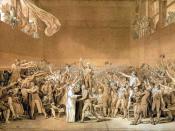Several factors that contributed to the development of France's economic crisis between 1787 and 1783 into a political revolution, one of which being the inevitable bankruptcy the nation faced from 1786. France's financial problem resulted from the country's participation in four foreign wars between 1733 and 1783. This heavy expenditure left France in heavy debt and with financiers reluctant to lend more money, bankruptcy was imminent. The fiscal policy arose from this in attempt to raise more revenue through a complete tax reform. France's tax system was both unjust and inefficient, with the peasants of the Third Estate contributing most heavily and the upper classes exempt. The government's unsuccessful attempts at fiscal reform were rejected by the privileged classes in an aristocratic revolt. Failure to appeal to the assembly of nobles decreased the people's confidence in the Old Regime, as the severity of the country's negative financial situation reached the public.
The nobles realized the proposal of taxation by representation would affect them negatively as landowners; hence they were against the system. The event demonstrated the incompetence of the monarchy to resolve issues, causing the people of the Third Estate to rebel against the Old Regime for the much needed equality and justice. Dissatisfaction and revolts leading up to 1789 helped turn France's economic crisis into a political revolution by October.
In July 1788, a food crisis resulting from the destroying of crops in Paris by a storm worsened the condition of the laboring population. The shortage of grain inflated the prices of bread, intensifying the working people's meager circumstances. The industrial sector was also heavily influenced by the loss of crops, as productivity declined with the decrease in demand for consumer commodities. Unemployment rose rapidly, as did the grievances of the people. From these feelings of discontent, the working...


